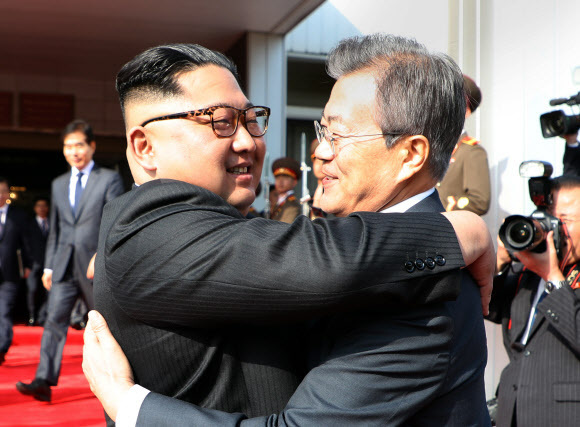 |
(Cheong Wa Dae) |
More students think the reunification of the two Koreas is unnecessary and the Korean Peninsula is not peaceful, a survey showed Tuesday, amid stalled progress in inter-Korean relations.
According to the survey by the Ministry of Education and the Ministry of Unification, 55.5 percent of the respondents said reunification of the Koreas was necessary, down 7.5 percentage points from a year earlier. Some 19.4 percent said reunification was unnecessary.
The majority of the students who said reunification was needed, 29.1 percent, explained their answers by saying Koreans are one people, up from 21.6 percent in the 2018 survey. Some 21 percent said reunification was needed to quell fears of war in light of threats from the North.
The survey was carried out between Oct. 21 and Nov. 29 last year and involved 66,042 students from 598 elementary, middle and high schools, as well as 3,817 teachers.
Most of the students perceived the North negatively, associating it with war and militarism (31.8 percent) as well as dictatorship (27 percent). The country reminded 21.8 percent of the students of the peninsula’s “one people” and reunification, 8 percent of poverty, 4.5 percent of its economic system, 3.2 percent of human rights issues and 1.6 percent of support and cooperation.
Fewer students (43.8 percent) thought North Korea was a country South Korea should cooperate with, compared with 50.9 percent in the 2018 survey. Some 36 percent thought the North was a country to be vigilant about, up from 28.2 percent from the previous year, and 8.1 percent said it should be considered an enemy.
The largest portion of those surveyed, or 29.3 percent, said reunification would mostly likely take place within 10 to 20 years and 22.2 percent said it could happen within five to 10 years, whereas 18.1 percent said it was impossible.
In the same survey conducted in 2018 amid an improvement in inter-Korean ties, 31.3 percent said reunification would be possible within five to 10 years, and only 9.6 percent said it was impossible.
Some 34 percent of the students said the Korean Peninsula is not peaceful, a jump from 15.5 percent in the 2018 survey.
Most of the students got their information about North Korea and reunification from the internet and social media (40.9 percent), followed by classes at school (28.6 percent), TV and radio (14 percent) and textbooks (7.4 percent).
More than half, or 55.3 percent, said their school education on reunification was helpful in promoting their understanding of reunification, down from 58.2 percent in the 2018 survey.
The liberal Moon Jae-in administration has focused its efforts on mending ties between the two Koreas, which technically remain at war since the 1950-53 Korean War ended in an armistice, not a peace treaty. Three inter-Korean summits as well as the landmark US-North Korea summit were held amid a reconciliatory mood in 2018, but little headway has been made since then as negotiations on dismantling North Korea’s nuclear and missile programs are at a standstill.
(
laeticia.ock@heraldcorp.com)







![[Today’s K-pop] Blackpink’s Jennie, Lisa invited to Coachella as solo acts](http://res.heraldm.com/phpwas/restmb_idxmake.php?idx=644&simg=/content/image/2024/11/21/20241121050099_0.jpg)
